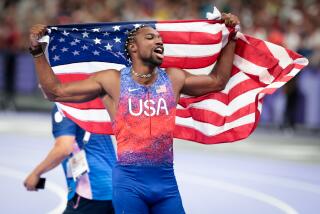Track’s future rests on sprinters’ tests
EUGENE, Ore. -- Please, let them be clean.
Please, let there not be any nasty surprises in the coming weeks involving positive tests for steroids or other performance-enhancing chemicals with unpronounceable names.
Let it be hard work, talent and gusts of hot summer wind that carried Tyson Gay to a spectacular, fastest-ever-recorded-under-any-conditions time of 9.68 seconds in the 100-meter dash Sunday at Hayward Field in the marquee event of the U.S. Olympic track and field trials.
Let it be nothing more than that same wind, clocked at 4.1 meters per second -- more than double the limit for verifiable records -- that combined with powerful thigh muscles, determination and a deep religious faith to boost 2007 NCAA champion Walter Dix to second place in 9.80 seconds.
The same for Darvis Patton, a former U.S. champion and world silver medalist at 200 meters who won the final Beijing 100-meter berth with a personal-best time of 9.84.
Let it be their times that, as Patton said, are “going to shake the world up a little bit,” and “make a little noise,” instead of some lab test that later has the thunderous impact of showing they were drug cheats.
For the sake of the sport in this country, for the sake of the team the U.S. will send to the Beijing Games, please let this event turn out to have been honest and fair and accomplished without anyone having resorted to chemical enhancement.
If it wasn’t, track and field is dead.
If it was, it could signal the beginning of a wonderful new era for a sport that has never quite known how to promote itself.
Now, it has been blessed with a legion of skillful and appealing athletes who can sell the sport with their vitality and vigor.
Foremost among them are the humble and soft-spoken Gay, the powerfully built, 5-foot-9, 190-pound Dix, and the lanky, 6-foot, 165-pound Patton, who was late to the trio’s post-race news conference but was promptly forgiven when he explained he had stopped to share his jubilation with his wife.
They can rebuild the trust this sport has lost at the elite level, these sprinters who earned their passage to Beijing on Sunday along with a fleet of pole vaulters, hurdlers, discus throwers and long jumpers.
But only if they’re clean.
Especially Gay, Dix and Patton, who on Sunday ran a race that was illuminated by a bright, scorching sun and the power of collective marvel.
Harvey Glance, who will coach the male sprinters and hurdlers on the U.S. Beijing team, understands that the sordid succession of drug scandals over the last decade naturally triggers skepticism when an athlete produces a personal-best time or distance.
Glance, a member of the gold medal-winning 400-meter relay at the Atlanta Games, believes that such cynicism is unwarranted in this case, and we can only hope he’s right.
Glance attributed their fleet times in part to technology, recalling the days he had a personal record of 10.01 seconds without benefit of videotapes and instant, millisecond-by-millisecond analysis of form and flaws.
In addition, modern spikes and bodysuits are engineered to be aerodynamically efficient, much like swimsuits are. Gay joked that the blue uniform he wore Sunday, with its red and white diagonal stripes and X on the back, has “some secret power,” and he’s probably not far off.
Glance also correctly pointed out that the sport has increased the vigilance of its testing, though he didn’t say it has sometimes been forced to do so.
“I just think these guys, with all the stuff that’s happening at this point, if they come here planning anything it would be just stupid of them,” Glance said.
“They’ve been tested, and I’m confident that these guys are clean.”
Testing hasn’t been much of a deterrent to some of their predecessors and probably won’t be as long as the chemists can stay ahead of the tests devised to catch them.
Just ask Marion Jones, now in federal prison in Texas. Or Justin Gatlin, who won gold, silver and bronze medals in Athens but tested positive for a performance-enhancing substance in 2006 and was banned from the sport for four years.
It’s impossible not to talk about drugs and cheating in this setting, but Glance hopes that it dies out, and soon.
“We’re hoping that these young athletes and the new generation will put a stop to all that,” he said.
Maybe it will be Gay and Dix and Patton who do that. Gay said he can run faster yet and rated his performance Sunday as merely OK as far as technique.
“I felt like I was pressing a little bit, but I relaxed toward the end,” he said.
“There’s still some little things I can work on.”
As he left the makeshift podium he walked gingerly, his muscles protesting after two days’ hard work. Better that kind of sore than the kind that a needle in the arm can leave.
--
Helene Elliott can be reached at helene.elliott@latimes.com.
To read previous columns by Elliott, go to latimes.com/elliott.
More to Read
Go beyond the scoreboard
Get the latest on L.A.'s teams in the daily Sports Report newsletter.
You may occasionally receive promotional content from the Los Angeles Times.







